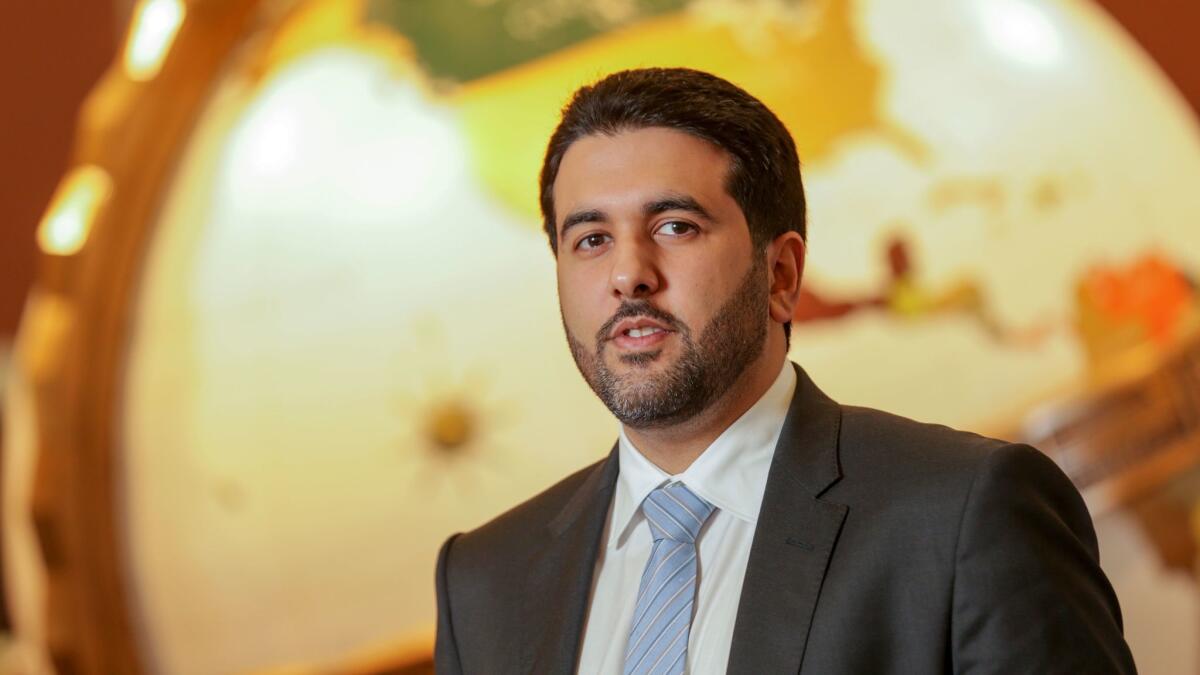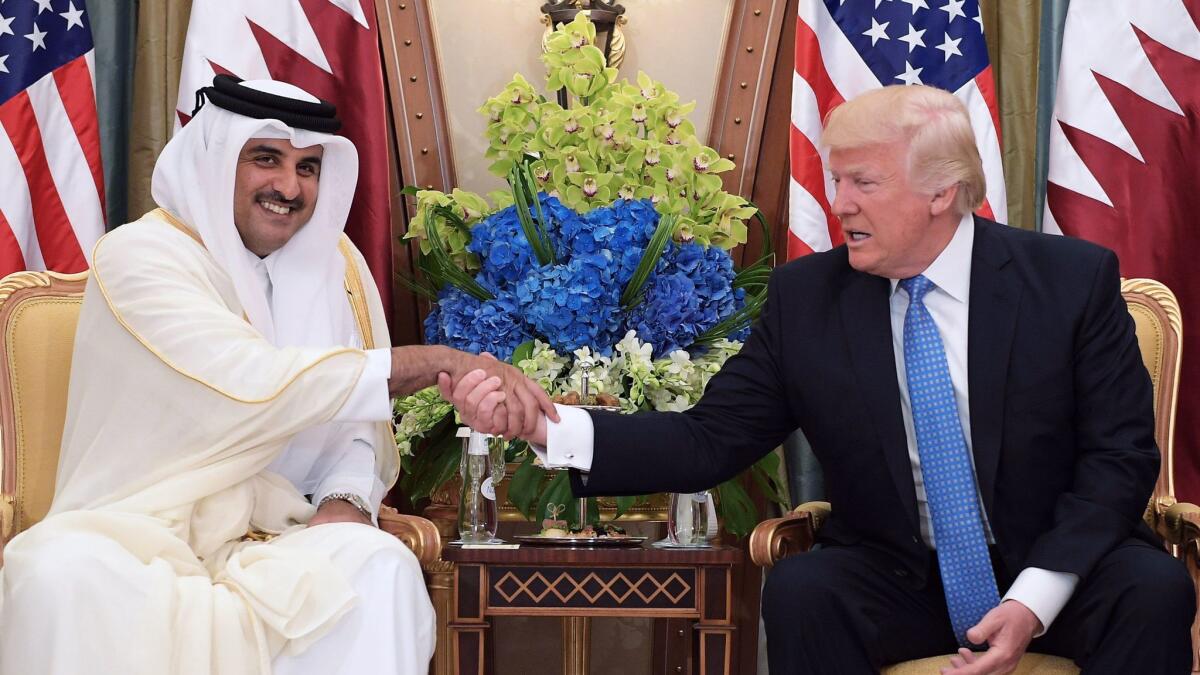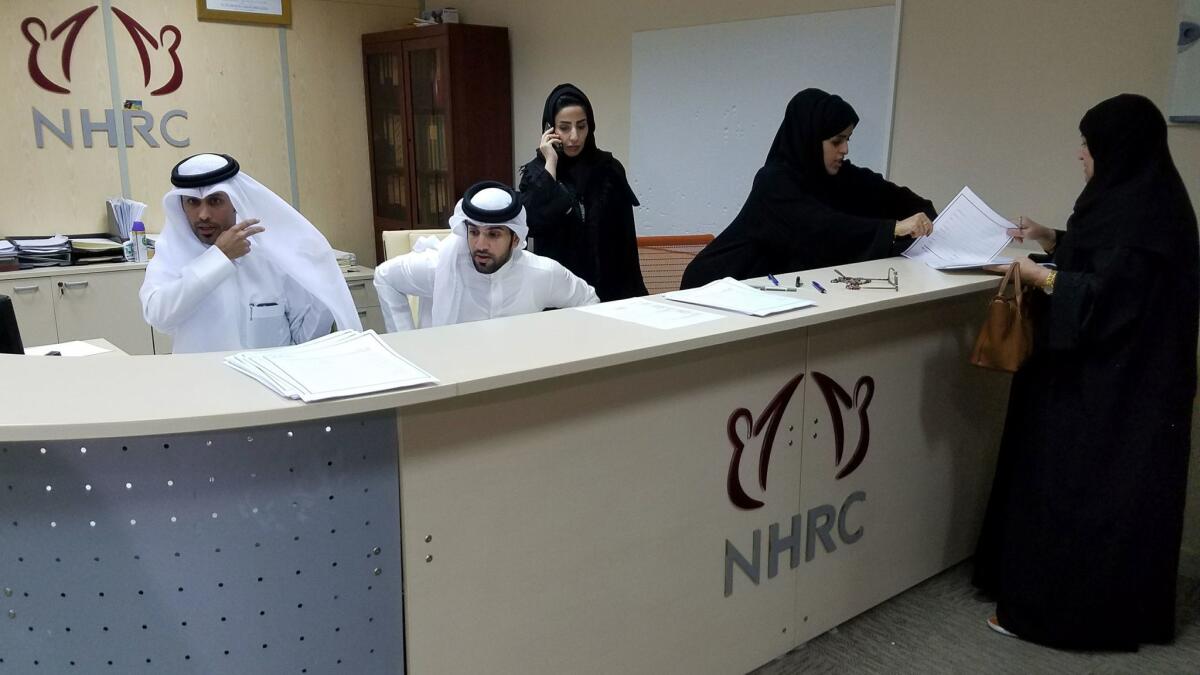Accused of funding terrorism and being too cozy with Iran, Qatar says it has done no wrong

- Share via
The tiny gas-rich nation of Qatar has been ostracized by its regional Arab neighbors, which accuse it of funding terrorism and being too cozy with Iran.
In June, Saudi Arabia, Egypt, Bahrain and the United Arab Emirates cut diplomatic and trade ties, closed their air routes to Qatari aircraft and served the government with a host of demands aimed at fighting terrorism and extremism. Mauritius, Mauritania, Yemen, the Maldives and one of Libya’s two warring governments also suspended diplomatic relations.
Qatar did little to quell the conflict last week when it announced it was restoring full diplomatic relations with Iran, more than a year after it pulled its ambassador in a show of solidarity with Saudi Arabia, whose embassy and diplomatic missions in Iran were attacked.
Qatari officials say their country has done no wrong and that a statement by the country’s emir that became a pretext for the row — he was quoted on Qatar news sites as praising Iran and the fundamentalist group
“Qatar does not fund terrorism whatsoever — no groups, no individuals. Not from afar or from a close distance,” Sheik Saif bin Ahmed al Thani, director of the government communications office, said in an interview with The Times’ editorial board and reporters.
His comments have been edited for length and clarity.

Why do these countries want to pick a fight with Qatar and why now?
I can answer what we think it is. We have differences in opinion. That is the main issue. Differences of opinion. We do not support parties or individuals or get involved in [the] domestic affairs [of other countries].
So when we get involved in Tunisia, or Syria … or Libya, we do not go around and pick a party or [an] individual.… We usually focus our attention on the public and try our best not to pick sides.
They accuse us of supporting the
After that, the opposition party won…. [And] we are the ones working with them. We did a conference last year in support of Tunisia, supporting investment. We established a fund for small and medium businesses.
How do you characterize your relationship with Hamas?
The Bush administration supported the elections in Palestine. They wanted to ensure the participation of all different entities in the election. And it was requested of us that Hamas participates.
Arab countries did not support the idea of elections. The U.S. wanted all Arabic countries to support the elections. So we took the lead on that. And other countries came in afterward.
So Hamas won the election. Hamas keeps a fraction of a political office in [the Qatari capital] Doha. Our funding to Palestine is all done through the
So whether it's money, or whether it’s building materials, it all goes through the U.N. and through our governmental structure, except the three or four times when we paid salaries and that was paid through the

Does Qatar have any relationship now with the Muslim Brotherhood?
We don't have a relationship with the Muslim Brotherhood. All of these accusations came because of Egypt. You know, when the Arab Spring happened, when the military was in control, we started supporting Egypt economically.
We had cash placed in their central bank. We committed to five shipments of gas free of charge, and other things. These commitments started before [President
We didn't stop [them] because these commitments were from us to the people of Egypt. So we don't really care who's in office. Other than that, we do not support the Muslim Brotherhood.
Morsi lost power in a coup. So it sounds like your government doesn’t care how a government changes.
We deal with what the people choose.
A coup isn’t the people’s choice.
Yes, but we will not get involved internally.
But by dealing with an illegitimate government that came to power via coup aren’t you de facto getting involved?
I get your point. But in the end, we won’t deal with domestic matters. To us, what's happening in Egypt is a domestic matter. The people chose not to do anything about it. So … we’ll go with their choice.
So if the Muslim Brotherhood rose and took power back your policies would be the same toward Egypt?
Yes.
What about claims Qatar paid billions of dollars to Iran and Al Qaeda-linked affiliates to secure the release of Qatari hostages that were held in Iraq?
The money was not given to any terrorist groups. While we were trying to get [the hostages] out, we did approach Iran. We approached any government that could help influence these groups to get them out.
Everything was done with the knowledge, and in partnership with, the Iraqi government, with the Iraqi intelligence and security.
What’s it going to take to resolve the crisis?
What it’s going to take is first to remove the blockade. This is not a way of bullying a country into taking a certain position.
And secondly we're willing to sit and negotiate and sit in a dialogue environment and discuss all these things. Of course anything that will affect our sovereignty and independence, we will not consider, even slightly. We will not sit at the table unless we have a sort of level playing field. But we're willing to discuss. At the end of the day most of these things are differences of opinion and we can discuss them.
What’s Qatar’s relationship with the Trump administration?
Broadly, the relationship between the U.S. and Qatar is a very strategic, strong relationship. It has always been strong. After Sept. 11, the U.S. military left Saudi Arabia for domestic reasons. They just moved everything to Qatar and we gave them our main and only airport as a base, until the current base was ready.
So our relationship with the U.S. is very institutional. We have a good relationship with the Trump administration, as we did with the Obama administration, and the Bush administration, and so on.
So you don’t take offense that President Trump sometimes comes across as being anti-Muslim?
I do not know if it’s correct to put it that way. The U.S.-Riyadh summit [in Saudi Arabia last May] was indeed successful. It had all the Muslim Arab countries there. We are the only country that has taken further steps with the counter-terrorism [agreement] we signed. It's the first of its kind for the region. So I don't really agree with your point [that Trump is anti-Muslim].
FOR THE RECORD, Aug. 27 2 p.m: An earlier version of this article incorrectly phrased a question as saying that Mohamed Morsi gained power in a coup. He lost power in a coup.
For more on global development news, see our Global Development Watch page, and follow me @AMSimmons1 on Twitter
ALSO
No nation-building in Afghanistan? Easier said than done, experts say
Another grim milestone for Yemen: Cholera infections soar to half a million
'China has conquered Kenya': Inside Beijing's new strategy to win African hearts and minds
Sign up for Essential California
The most important California stories and recommendations in your inbox every morning.
You may occasionally receive promotional content from the Los Angeles Times.








